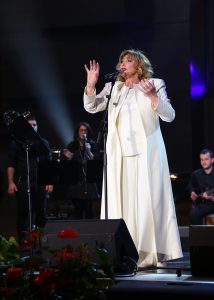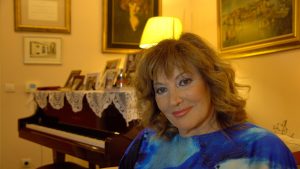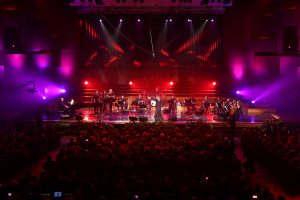Love has always been the driving force in my life. Love towards my family and friends, singing, music, nature, animals…
Tereza Kesovija had a concert at the Vatroslav Lisinski Concert Hall in Zagreb recently, celebrating the 60 years of her fascinating career. She received a standing ovation while her son gave her the biggest and most beautiful surprise of the night – he spoke of the love and support for his mother in front of the packed audience. Needless to say, everybody was very touched. In an interview for Diplomacy&Commerce magazine, the diva of the Croatian music scene talks about love always being the driving force in her life and about her good-natured spite that has always pushed her forward.

-
You have recently celebrated 60 years or rather 6 lustrous decades of your career with a concert at the Vatroslav Lisinski Hall. Who is Tereza Kesovija today, and are you aware of the success and the impact you have had with the musical legacy you are leaving behind?
Working with the same fervor and the same love for the past 60 years is the guarantee of survival, both for me and others who experience this. Today, I am aware of the fact that a person should never slacken in any respect, and especially not forget or ignore the most important thing in life – love. This word, in its full meaning, is written in capital letters. Love brought me to where I am here today, because for me, thanks to the auspicious circumstances, love for singing has become my profession. Today, I am a happy and fulfilled woman brimming with love.
-
At the very beginning of your career, could you have even fathomed all of the professional success you have today, and would you have done something differently if you had to do it all over again?
Before I started my career, I lived in a rather special environment as far as people are concerned, but also the nature that matters to me a lot. I am talking about my Konavle and my Dubrovnik. As a flute student I played in Dubrovnik, and the people who were in charge of deciding what I should do next really believed in me, and believed that I could do more. The pastoral (village) has always been living in me, and I portrayed the tradition in my part of the world through the instrument that I played. Wherever I happened to be in the world, the beauty of rural is something that exalted me as a person while preventing any ugly thoughts from appearing. I saw myself living there without actually realizing what my destiny had in store for me. Maybe I was imagining it, but I did not know that there would be many suprises in my life, that are now behind me. So, here I am, here with you, with my family and my fans.

-
You were a role model for many people. They wanted their career to emulate yours. And this remains true to this day. Did you have role models, and what advice would you give to your younger colleagues?
I did have role models. They were there somewhere, just across the road from Dubrovnik where I grew up, in Italy. To be more specific, my role models came from the famous San Remo festival. Let’s not mistake role models for idols; they are not worshiped people. I do not like when someone tells me that they adore me. You can respect me, love me, but do not idealize me. My role models were Mina and Milva, and not only because of their singing, but also because how they carried themselves, performed, their gestures… And that is the whole point – to be a role model to someone in every aspect. I would also like to be a role model to them in terms of cooperating with foreign record companies. In my career, I have recorded for many world famous, renowned labels like, for instance, EMI, Pathe Marconi – today’s Warner, Columbia, CBS, Barclay, Sonopress, Phillips Italy and Philips Germany, and even the Russian record label Melody and the Bulgarian Balkanton. Today, and I am not talking only about Croatia, but the whole region too, there are very few rounded-off personalities which can been seen from how they interpret music. My advice to them is that they have to be good at performing which is something that you can see and hear with real artists. That is my advice to young people who want engage in this noble profession.
-
You studied the flute, and you also play the piano. How important is music education to you, or does it all boil down to having talent?
Education is absolutely necessary! Talent is not enough. True, talent is the backbone, but if there is no knowledge applied in upgrading your skills, you will not be an artist, but just a musician. You need to learn and evolve. Everything that we do remains forever. That’s why our opus should be complete.

-
You wrote two books including an autobiography titled “That’s Me” which was in the making for a very long time. Could you reveal to our readers what prompted you to write a book? Is Tereza in the book the real Tereza and is there anything that you have left for another book, the sequel to the first one?
Truth be told, when I was nearly finished with the book I said to myself that one day I would figure out how much I had left out. It’s just the way it goes! When overwhelmed by emotions, you want to write and describe everything, but that is not doable. I have inadvertently left out certain people and situations. My guiding thought was to describe my Konavle and Dubrovnik, because I have the pathological love for them. Actually, the first story that I started my book with was the death of my mother whom I had never met. The book was written very gradually, and is an account of a certain period, and history, as well as a document about national costumes, traditions, life and the era in which I grew up. I am an avid reader and, as a little girl, I used to read under street light. My brother and I read a lot, day and night, and everything that I adopted through reading surely had an impact and resulted in the decision to start writing myself.

-
During your career, you often sung in front of diplomats, ambassadors and politicians. When they listened to you and reacted to your energy, charisma and voice, were they any different to, for the lack of a better term, ‘ordinary people’? Who enjoyed music the most?
As a rule, there should be no difference. Maybe the “ordinary people”, who are not under so much stress and responsibility in life, are more likely to enjoy music. But politicians are people too! They also like to relax and enjoy. Out of many politicians that I used to sing to and liked to sing in front of, Tito was the most relaxed. He was a real hedonist, loved singing, music, and the people around him. I am not referring here to the man who was the leader, but to Josip Broz. The first one is a politician, the other is an ordinary man. In the end, music and singing are a cure for the soul, everyone loves them and everyone enjoys them in their own way. I am here to convey an emotion and a message in my own way.
-
You have performed at numerous festivals, and you have won at many of them. What do you think of the festivals today, and the quality of singers and songs?
Everything has changed over time, and even festivals that do not resemble the ones from yester years. There is no energy at these festivals, no proper approach to them, no real experience… Also, many have been wondering where have all the real festival stars gone, and why festivals have no real value any longer. Festivals have lost their charm. Audiences are not drawn to them, there is no enthusiasm, no feeling of festivity, and a certain quality level. Back in the day, the songs had meaning and the melodies were pleasant. Today, it’s all a bit different. It’s important to be yourself and have a unique appearance, but how you sing is even more important. It seems to me that we are somehow lacking in rounded-off performers; you know, the ones that are ‘the whole package’, so to speak. In this day and age, you are one of the two, but not both. This certainly affects everyday life and survival of festivals. While we are on the subject of festivals, I would just like to mention that that I performed songs by such reputable composers as Zdenko Runjic, Nikica Kalodjera, Arsen Dedic, Kemal Monteno, Djelo Jusic and others at festivals all over Yugoslavia.

-
Back in 1965 you moved to France where you built a successful career. Your concert at the famous Olympia in Paris was your crowning achievement. You competed at the Eurovision song contest twice – once in 1966, representing Monaco, and then in 1972, representing Yugoslavia. When you turn back time and reminisce about that period of your life and career, what is the first thing that comes to your mind?
That was a glorious and fruitful time that I remember very fondly. However, not everything went smoothly although it seems so at this time distance. I have something in me that is primordial and that is also inherited and genetically directed – spite – which, when real, can be used very successfully. Spite is a powerful force to have – I want it because I want it! And when we talk about that period, that’s the first thing that comes to my mind. My career in France started back in 1965, when I performed „Lara’s Theme“ („La Chanson de Lara“) from the film Doctor Zhivago. I was the first to record and sing this famous song in several languages. In terms of my career in France, I would also like to mention the collaboration with the stars such as Serge Lama, Tino Rossi, Gilbert Bécaud and Rita Pavone. I had the first concert in France in 1988, in Olympia, Paris. In 2007, nineteen years after having my first concert there, I had a total of four concerts in the famous Olympia.
-
Your French period, the music, the art… When did you start really liking it and did you ever consider any other country, music, or art? Why did you choose France?
Good question! My view is that there are no coincidences in life. Tito Strozzi was somewhat to blame for me leaving for Paris. He had a friend who had a friend who was looking for young talents to perform in the cabaret at that time. These were the golden years of Paris! The young talents included Gabi Novak, Ljiljana Petrovic, Lola Novakovic and myself. After several elimination rounds, I was the only one left, even though they were very frustrated that Gabi just thanked them and returned home. In the end, they chose me as a temperamental Mediterranean. They believed that I was the best choice for singing chansons, which were very popular back then. That was indeed the golden age of Paris, which now exists only in memories. The time of the real, fine cabaret! That’s the reason I chose Paris and France.
-
What is Tereza Kesovija looking forward to? What makes her happy? What kind of message would you like to convey for the end of this interview?
I look forward to every new project. I see myself more clearly now than ever before and I am more mature than ever before because of the experience I have. I was very happy with my concert in Lisinski, and marking this remarkable career of mine. I’m very proud of that, and I wanted everyone to be proud of me. I have experienced something phenomenal from the person I am most proud of – my son, who is really not that fond of photographers and public appearances. My son Alan stepped onto the stage, and made the audience cry by saying that I was the best mum in the world. My message to your readers would be – love yourself, respect yourself and take care of yourself.

The First Lady of Croatian Music
She recorded songs in nine languages. In 1999, she was knighted for her exceptional contribution to culture (Chevalier des Arts et Lettres – Order of Arts and Letters) by the President of the Republic of France (Tereza received the title from the then French President, Francois Jacques Chirac). Shortly thereafter, she was given the Golden Charter of Humanism. Her French LPs and ESPs are re-edited in a digital format, featuring the works of French composers and writers which makes them “patrimoine francais” (in French, cultural goods, heritage). Tereza also has also performed at the great concerts of UNICEF in Montreal, Paris and Geneva.